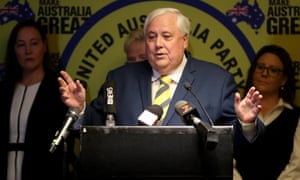There’s a discomfiting conjunction if Scott Morrison wins and the United Australia party leader picks up a Senate spot
As we embark on the final sprint to Saturday night, we need to talk about Clive Palmer.
Interestingly, the final Guardian Essential survey for the election campaign suggests the controversial businessman isn’t quite as prominent in voters’ minds as he was a week ago. He’s slipped back in the news stories that are cutting through, but Palmer is continuing to turn up in dispatches.
Palmer has pushed his way back into the national spotlight because of an extraordinary advertising spend. That spend, which has made him a player in this contest, has prompted the Liberals to enter a preference deal with the United Australia party in order to boost their electoral prospects on Saturday night.
You wouldn’t think it could happen – that saturation
advertising could make you a player in Australian public life rather
than the potency of your ideas – but it clearly has happened.Interestingly, the final Guardian Essential survey for the election campaign suggests the controversial businessman isn’t quite as prominent in voters’ minds as he was a week ago. He’s slipped back in the news stories that are cutting through, but Palmer is continuing to turn up in dispatches.
Palmer has pushed his way back into the national spotlight because of an extraordinary advertising spend. That spend, which has made him a player in this contest, has prompted the Liberals to enter a preference deal with the United Australia party in order to boost their electoral prospects on Saturday night.
As well as the unlikely second coming of Palmer, there have also been head scratching reports throughout the campaign about possible resource sharing between Palmer and the Liberals, like the story of a Facebook account linked to the UAP paid to disseminate an ad for the Queensland LNP.
Bill Shorten has turned his rhetorical guns on Palmer, particularly in this final week, painting him as a agent of “chaos” in the political system – a person with undisclosed interests seeking to exert influence in the Australian parliament.
Labor is doing this for an obvious reason. Palmer’s return is depressing Labor’s primary vote, because he’s managed to style himself as a respectable “protest” option outside the major parties, which is a potent pitch at a time when voters are clearly casting around for alternatives.
Trying to disrupt Palmer’s momentum is important to Labor’s electoral prospects on Saturday night, hence all the focus.
But putting Labor’s partisan interests to one side, there are objective reasons for concern about the rapid rise of a political shopfront for a billionaire that offers voters tag lines instead of detailed policies (make the interest on home loans tax-deductible, fast trains for Brisbane, increase the pension by $150 a week, process minerals in Australia).
Sticking with fast and loose, there was also that extraordinary story about a UAP candidate who told my colleague Paul Karp she’d told the organisation four times that her parents were born in Syria and Lebanon before the party submitted blank forms without their place of birth to the Australian Electoral Commission, as part of section 44 compliance.
There is not only the problem that we’ve already seen Palmer in political life, and his contribution was, let’s be polite, less than stellar – there is the fact we are only days away from an election, and it is completely unclear, beyond “every child gets a pony, a fast train, and a minerals processing plant”, how the businessman would use power in the event Australians send him to the Senate.
Beyond that basic void, there’s a discomfiting conjunction.
The Liberals in 2016 sought the appointment of a special purpose liquidator to maximise the return to the taxpayer from Palmer’s collapsed Queensland Nickel business. The then employment minister, Michaelia Cash, declared the government would “use every power at its disposal to ensure the corporate dealings of this joint venture arrangement are thoroughly investigated and responsible company officers are held to account”.
The government used its position as a creditor to seek the appointment of the special purpose liquidator, working for the commonwealth, alongside the general liquidator to “maximise the recovery of monies to meet employee entitlements” as Cash put it in 2016, adding the government was taking that action because of the “unique and alarming circumstances in this case”. These matters are currently being pursued in the courts.
So if Scott Morrison wins on Saturday night, and Palmer also picks up a Senate spot, we will have the strange set of circumstances where a relentless pursuit of the businessman’s corporate past – sought by the Liberals in 2016 – is underway at the same time as his vote will need to be courted in the upper house.
Now call me old-fashioned, but that all seems a bit delicate.

No comments:
Post a Comment